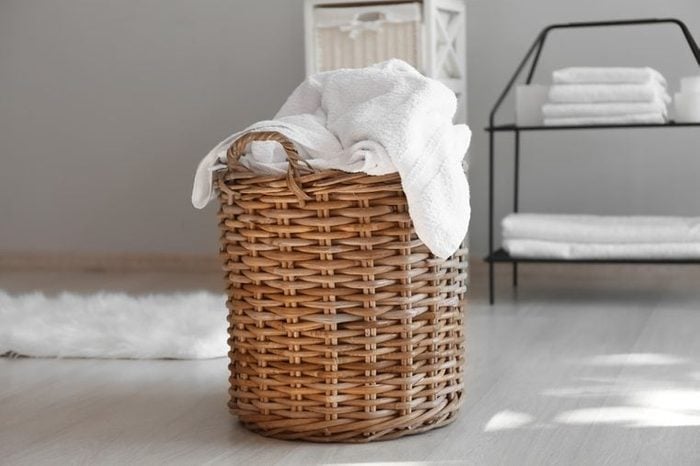Here’s How Often You Should Wash Your Towels
Updated: Dec. 13, 2022

How bad is it to use a towel over and over? Here's how often you should wash towels, where to hang them and when to replace them.
It seems like there’s always a debate around hygiene questions. Here’s one of the latest: How often you should wash your bath towels?
Dirty, damp towels could harbor dead skin cells, bodily secretions and more, according to Philip Tierno, Ph.D, a microbiologist at New York University Grossman School of Medicine.
“When you wipe yourself off with your towel, you are picking up these dead cells on the surface,” Tierno says. “You’re also picking up any secretions that come from your nose, mouth, anus or genitalia into that towel. So you do load it, so to speak, as you dry yourself, with a group of various microorganisms and they sit there on that towel.”
Dr. Annie Gonzalez, a board-certified dermatologist at Riverchase Dermatology in Miami, says dirty towels can incubate bacteria, fungi and other germs. “Pollution from environmental aggressors, dead skin cells, oil and dirt all can be transferred from your body to your towels when you dry off,” she says.
With that in mind, here’s what the experts say about this hygiene question.
On This Page
How Often Should You Wash Your Towels?
The answer depends on a few factors. In general, Tierno recommends using bath towels two to three times max before washing them. Gonzalez advises washing your bath towel every three to four uses, or at minimum once a week. And the American Cleaning Institute suggests after every three uses.
Here’s what may determine if you should wash your towels more often.
How the towel dries
How towels dry is equally as important as how often you wash them, according to Tierno. That’s because, Tierno says, a dry towel generally helps kill organisms or suppress their growth better than a wet towel.
“All organisms need water to grow, and therefore you will supply that with an ambient high humidity,” Tierno says.
Hanging a wet towel in the bathroom exposes it to that ambient humidity, lengthening drying time and allowing organisms to grow and live longer. The same is true if you fold a wet, dirty towel. So your bath towel is one of the things you shouldn’t store in the bathroom.
Instead, dry your towels outside of the bathroom, leaving them hanging or unfolded so moisture evaporates. If the towel is wet to the touch long after your shower, wash it and swap in another one.
Your hygiene
Tierno also highlights the importance of genital hygiene. If you have good wiping and hygiene habits, your towel may be less dirty after you bathe. That may mean getting away with using it more often.
Skin conditions
If you have toenail fungus, athlete’s foot, jock itch, or warts, use freshly washed towels to ensure germs cannot be spread to other parts of the body, Gonzalez says.
“Dirty towels can also flare up eczema or dermatitis because they can drag bacteria to other parts of the body and irritate the skin, thus causing eczema flare-ups,” Gonzalez says. “People suffering from acne may see an increase in lesions when drying their face with dirty towels.”
So if you’re dealing with any of these skin conditions, washing your towels more often isn’t a bad idea.
What’s the Worst Case Scenario?
What’s the big deal if you use a damp, dirty towel? Well, Tierno says a towel is a repository or storage for potential pathogens like E. coli and others germs. If you introduce these to a lesion, abrasion or slight cut on your body, you might get a boil or a zit.
An infection in a cut is possible, although the chances are low there’s a significant opening in the skin, Tierno says. Not washing towels can allow cause cold germs to migrate from one person to another, too, Gonzalez says. In more extreme cases, dirty towels may spread bacteria like methicillin-resistant Staphylococcus aureus (MRSA), a dangerous staph infection that’s difficult to treat with antibiotics, Gonzalez says.
How Often Should You Replace Towels Entirely?
As long as you wash them often, bath towels could last up to two years, Gonzalez says. “A basic rule of thumb is to replace your towels when you feel they are no longer soft or absorbing water,” she says.
Tierno says you only need to replace towels when they stop doing their primary job. “If it is torn, ripped, or unable to absorb, then you buy a new one,” he says. “It has nothing to do with the germs.”
Tips on How to Wash Towels
Tierno recommends washing towels in bleach and water. For people who prefer colorful towels, he suggests adding a disinfecting non-bleach with soap and water. He also recommends cleaning your washing machine.
“Periodically, you want to throw bleach in the machine on an empty cycle to get rid of any repositories that may occur over time in the reservoir,” he says.
Can you wash towels with your clothes?
You can wash regular clothes together with bath towels if you use bleach or a disinfectant, Tierno says. But Tierno specifically advises against washing towels with underwear.
“Used underwear contain genital and fecal bacteria, and unless you use bleach, you will have residual microbes in the reservoir water,” he says.
Is washing towels with vinegar a good idea?
No, Tierno says, because it’s a weak disinfectant. “It’s not a good use of vinegar,” he says. “Keep it for salads.” Still, there are plenty of worthwhile healthy uses for vinegar.